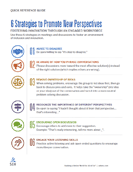As the world changes, effective community engagement has become more important.
Demographic shifts and advances in technology have changed the how, where and when of community engagement. With more opportunities to engage than ever, it’s important to balance the power of new strategies to promote new perspectives.
The Engagement Spectrum

Inform (make sure they know what you are doing), Empower, Collaborate (stakeholders help make decisions with a full seat at table)
Purpose should drive every effort
It’s easy to start using tools you think will benefit your project, especially if they are new and exciting. New social media platforms, online survey tools—these tools are enticing to use, but can be inefficient if not anchored by your goals. What are your project goals? Who needs to know what and when? Some tools are better for informing. Others are better for generating ideas. Others work better for collaboration. Use the combination of tools that best serves your project and audiences.
Stakeholders want consistency and transparency
Today, with a world of knowledge at our fingertips, we’re used to getting information instantly, whenever and wherever we want it. It’s important to mirror this expectation as best you can in public participation efforts. Timely and accurate updates that are communicated regularly not only make your communications more effective, they build trust. At the same time, be transparent about project constraints—funding, regulations, property impacts and costs—that may impact the project.
Phases of Collaboration
More public participation can yield more conflict. Don't be discouraged. This is a common step as you move toward consensus.

More participation can mean more conflict — and that’s okay
Successful engagement reveals a diversity of opinions. Sometimes differences of opinion are subtle. Other times they are highly diverse. Either way, this process of whittling down and making choices can expose conflict. This is common and should be expected. As you press onward, you’ll find participants will agree more as they make tradeoffs, develop a shared framework and see things alike. Guiding principles or shared values help guide stakeholders to agreement or, at a minimum, consent.
Consensus is not always realistic or appropriate. But, if stakeholders feel genuinely heard, they are much more likely to be okay with the outcome.
– Bonnie Morey, SEH learning and development manager
6 strategies to promote new perspectives

AGREE TO DISAGREE
Be open/willing to say "it's okay to disagree."

BE AWARE OF HOW YOU PHRASE CONVERSATIONS
Phrase discussions more toward the most effective solution(s) instead of the right solution (which implies others are wrong).

REMOVE OWNERSHIP OF IDEAS
When solving problems, encourage the group to list ideas first, then go back to discuss pros and cons. It helps take the "ownership" (my idea or your idea) out of the conversation and turn it into a more neutral problem solving discussion.

RECOGNIZE THE IMPORTANCE OF DIFFERENT PERSPECTIVES
Be open to saying "I hadn't thought about it from that perspective... that's interesting..."

ENCOURAGE OPEN DISCUSSION
Encourage others to add more to their suggestion. Example: "That's really interesting, tell me more about...."

ENGAGE YOUR LISTENING SKILLS
Practice active listening and ask open-ended questions to encourage more/deeper conversation.

Download your Quick Reference Guide
to promote new perspectives.
Wrapping it up
A diverse community helps us learn, grow and benefit from fresh insights. An inclusive culture creates an environment where everyone can feel valued and bring their very best. Promote new perspectives into your next meeting to help foster an environment of inclusion and innovation.
About the Expert

Bonnie Morey is a learning and development manager who recognizes the importance of developing training and initiatives to create and foster an open and inclusive environment. Follow Bonnie on Linkedin


